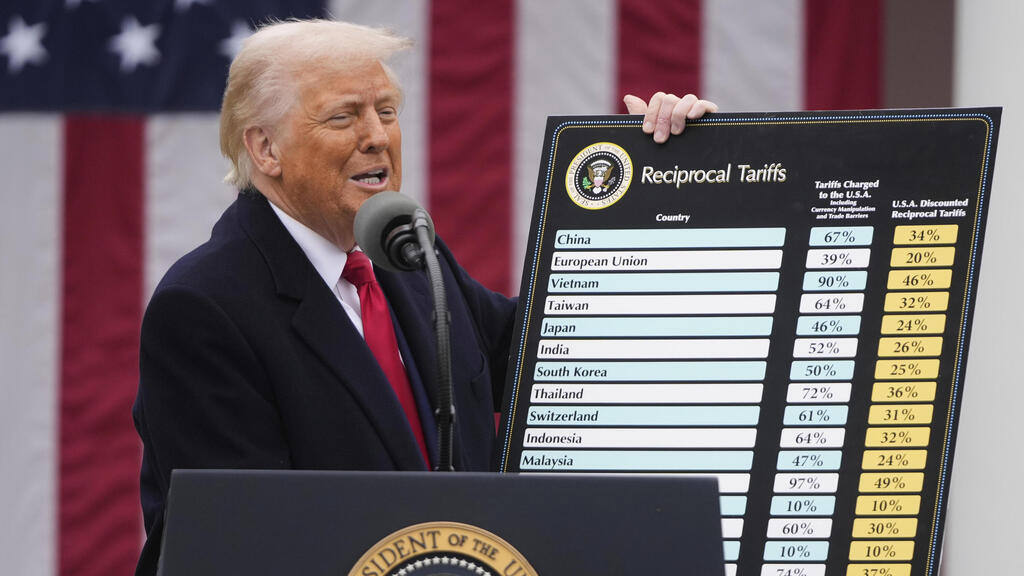Getting your Trinity Audio player ready...
U.S. President Donald Trump’s new tariff policy is likely to have direct consequences for Israel and its citizens. Trump has declared his approach to tariffs as reciprocal, but it remains to be seen whether Israel will completely lift its own import tariffs on American goods—and whether, in turn, Trump will indeed refrain from imposing tariffs on Israeli exports to the United States.
However, Trump’s tariff strategy is just a symptom—blunt and indiscriminate, much like the president himself—of a far broader phenomenon. Failing to take this shift seriously could put Israel’s security at risk in the not-so-distant future.
In recent years, we’ve been witnessing the gradual and fateful unraveling of the post-World War II international order. That era, while marked by wars and suffering—including for Israel—also brought economic growth, improved living standards and the unprecedented spread of liberal democratic ideals across much of the world.
Roughly four decades ago, this world order took a step too far with its extreme embrace of globalization. In the short term, it seemed that most of the world’s population was benefiting from it. For Israelis, as in other Western countries, the clearest sign was the flood of cheap consumer goods that filled our markets. But from the outset, that prosperity came at a high cost.
Globalization devastated the livelihoods of millions, especially among the working class in developed countries. In Israel, one well-known example is the 2008 closure of the Polgat textile factory in Kiryat Gat—effectively the death knell for the country’s textile industry and a blow to other sectors as well. Similar trends played out across the Western world, and on an even larger scale in the United States.
Today, Trump’s tariff policies, however clumsy and sweeping, are a response aimed at reviving domestic manufacturing. Globalization also encouraged wide-scale migration policies, whose consequences are evident around the world, particularly in Europe. The outcome of these trends has been a backlash, one that for years has fueled the rise of nationalist movements across the Western world. And it’s quite possible we are still only at the beginning of this process.
In the economic realm, we’re now seeing a partial return to the old model of mercantilism, which prioritizes a positive trade balance—exporting more than importing—as a national goal.
Preparing for the worst-case scenario
For Israel, this global trend—whether it leans toward more globalization or toward protectionist mercantilism—poses significant dangers. Beyond the economic and social challenges it presents to all nations, Israel faces a set of unique vulnerabilities.
If developed countries move further toward self-reliance and domestic production of essential goods in the coming decades, then a small and geographically isolated country like Israel will have no choice but to follow suit. Preparing for that scenario now means planning for the worst-case outcome, because Israel cannot afford strategic errors.
 Dr. Nathaniel Wolloch
Dr. Nathaniel WollochBlind reliance on the United States—encouraged to an unprecedented degree by Benjamin Netanyahu, more than any other Israeli leader—must not be taken for granted. That over-reliance is a danger in and of itself. As we’ve learned with regret over the past year and a half, Israel currently lacks the capacity to independently produce the ammunition its military needs.
Strategic strength does not come from weaponry alone—it depends just as much on economic resilience and independence. While Israel’s high-tech sector is thriving, that is not enough. Like other Western nations, Israel has become heavily dependent on global trade and the import of essential goods: medicine, vehicles, oil, iron, rubber and more.
Get the Ynetnews app on your smartphone: Google Play: https://bit.ly/4eJ37pE | Apple App Store: https://bit.ly/3ZL7iNv
The deterioration of ties with Turkey, a country on which Israel has long relied for certain supplies, is an ominous sign in this context. If the world continues shifting toward mercantilism and the prioritization of domestic production over imports, Israel will face a serious challenge—potentially even an existential threat.
To mitigate this, Israel must immediately begin encouraging local production of any goods that can be manufactured domestically and adopt massive stockpiling of all raw materials it cannot produce on its own. Addressing this will require a long-term, serious national policy. Needless to say, such foresight and initiative cannot be expected from the current government.
- Dr. Nathaniel Wolloch is a historian


